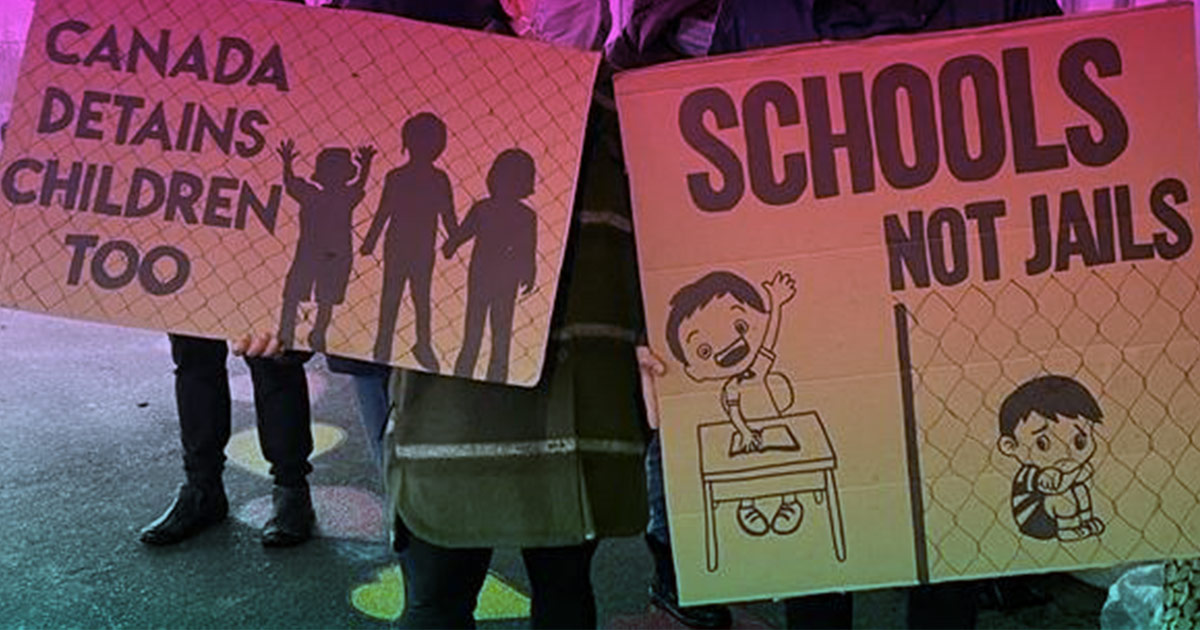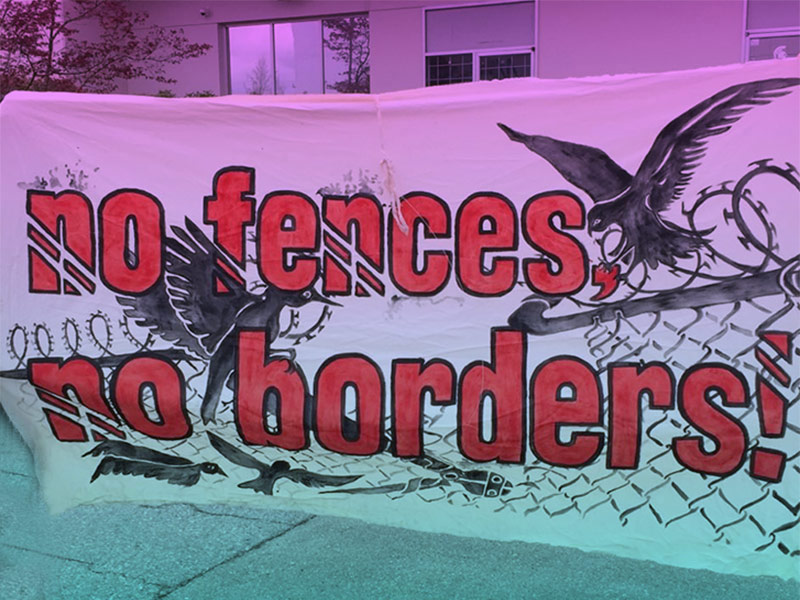Premier John Horgan announced recently that B.C. was “Ready to open our hearts and our homes to the refugees [who] will be coming,” referring to the crisis unfolding in Ukraine. Despite that warm welcome, the B.C. government is still part of a cruel, unjust and deadly immigration detention system.
For over 30 years, immigration detention in B.C. has been done through an arrangement between the provincial and federal government’s Canada Border Services Agency. The immigration detention agreement is currently under review by Minister of Public Safety and Solicitor General Mike Farnworth.
While the review is underway, detainees are being held at B.C. correctional centres and pretrial facilities in Port Coquitlam and Maple Ridge, in addition to a federal holding centre in Surrey.
Today, April 4, is Refugee Rights Day 2022. We call on the B.C. government to end its role in immigration detention.
Detaining migrants is not the #WelcomeToCanada politicians proudly announce — but it is part of the colonial regime that operates on sovereign Indigenous land.
Precarity and fear: realities of detention
"Immigration detention" describes the arbitrary and often indefinite detention of migrants. Canada's immigration system is a complex patchwork of policies that have increasingly narrowed the avenues to obtain and maintain permanent status as a resident of this country. This leaves many migrants in precarious, or even undocumented, situations. The current framework set out by the Immigration and Refugee Protection Act constantly threatens individuals without citizenship — forcing them to contend with possible arrest, detention, inadmissibility findings and deportation.
Policies of detention and expulsion create fear in the newcomer community and negatively impact the mental health of detainees.
As activists supporting the migrant justice and prison abolition movements, we have observed how detention coerces migrants to waive their rights, withdraw applications, stop collecting evidence for legal proceedings, and sever connections to counsel and community support. For example, Amnesty International and Human Rights Watch reported that “CBSA officers threatened to deport [detainees] if they applied for refugee protection or otherwise attempted to stop them from claiming refugee protection.”
On average, over 1,600 people are annually held in immigration detention in B.C. Although numbers dropped due to COVID-19, in 2020 and 2021 over 300 people were still detained in the province.
While immigration violations are administrative offences similar to unpaid parking tickets, detainees are incarcerated without charges, sentences or an adequate appeals process. There is no time limit on immigration detention, which means that as long as detained migrants are provided monthly review hearings, it is legal to hold them indefinitely.
Decisions on detention are made arbitrarily, with no real criteria. In practice, this means some individuals can be held for years at a time.
Canada’s longest immigration detentions have lasted over a decade.
Detention is deadly
Despite warm and welcoming rhetoric about refugees, the CBSA is an enforcement agency, with operations driven by annual quotas.
A 2018 independent federal audit found that systematic injustice, including lack of procedural fairness, impacts detainees during review hearings.
Recently, the federal court found that Immigration, Refugees and Citizenship Canada and the CBSA were violating a detainee’s right to procedural fairness and her rights under Section 7 of the Charter of Rights and Freedoms, all while arguing for her continued detention.
The government has responded to communities speaking out against detention — including advocacy at inquests and hunger strikes — by implementing the National Immigration Detention Framework, which does nothing to address the human rights violations at the core of detention and deportation practices.
An affront to human dignity
On Refugee Rights Day 2022, the unscrupulous practices at the heart of immigration detention must be brought to light. These practices include fraudulently obtaining passports for detainees and paying human smugglers to deport people.
Immigration detention exists amidst humanitarian crises created by settler colonialism, white supremacy, anti-Black racism, capitalism, ableism and other intersecting systems of domination and oppression.
As long as the B.C. government incarcerates people —including in immigration detention — it justifies the exploitative, dangerous and illegal systems that uphold these institutions.
Immigration detainees held in provincial prisons have died unnecessarily, unnaturally, and unjustly while inside. They have been victims of murder, suicide and neglect.
Since 2000, at least 17 people have died in immigration detention, with at least five deaths since 2016. Despite these tragedies, the CBSA cites “limited control over detention conditions in non-CBSA facilities, which poses challenges in ensuring a common standard of care.”
We know that human caging — under any regime — causes harm.
Amidst overlapping public health, social and colonial emergencies, the continued reliance on prisons represents an affront to human dignity and an insulting use of public resources.
As Justin Piché, Kevin Walby and Abby Deshman observed in Policy Options, COVID-19 in prisons leads to restrictive conditions inside:
Programs are cancelled. Scarce health and mental health services become even more limited. Solitary confinement and austere conditions of imprisonment are imposed for weeks or months on end in the name of infection control. The results are devastating. Prisoners’ physical and mental health deteriorates. Tensions escalate. Cultivating a COVID-19 petri dish and subjecting people to warehousing is not a recipe to improve public health or community safety. Quite the opposite.
Some advocates call for an end to immigration detention because it “co-mingles” detainees with criminally accused and convicted individuals.
We believe that no system of incarceration is humane.
In addition to jailing migrants, BC Corrections detains Indigenous people at alarming rates — 35 per cent of people in provincial custody are Indigenous, and 27 per cent of people subject to community sentencing are Indigenous.
Harsha Walia, author of the 2021 book Border and Rule: Global Migration, Capitalism and the Rise of Racist Nationalism, draws attention to the harms of all incarceration:
Immigration detention, like all carceral systems, is an institution of spatialized capture and confinement that reinforces criminalization across race, class, citizenship status, gender, sexuality, ability and more. Whether it is prisons or detention centers, declaring the "innocence" of those forcibly incarcerated is a limiting political stance since criminality and illegality are both political constructions intended to maintain racial capitalist power and the state’s social control. No one should be subjected to the harms of immigration detention or the colonial prison industrial complex.

Immigration detention is part of the unjust prison and policing system
Immigration detention is part of a continuum of criminalization that Black, Indigenous and people of colour must contend with, involving multiple layers of government and enforcement.
This system cites criminal records and “security” as a basis for detention. Migrants, especially people with precarious status, are deeply vulnerable to racist policing and its lifelong consequences.
B.C.’s Human Rights Commissioner acknowledges “racial disparities do exist in policing in B.C.,” and further identifies ableism and racism in the immigration detention regime. While the CBSA does not track disaggregated race-based data, numerous lawyers, researchers and advocates have noted that the majority of detainees are people of colour, particularly Black African migrants.
These disparities translate to ongoing criminalization, and harsh and punitive treatment when detained. For migrants, a criminal record, even for trivial or minor offences, can lead to what’s known as double punishment — a process that enables both detention and deportation.
The CBSA’s reliance on supposed criminal histories particularly affects people who came to Canada as children and spent time in the child welfare system. Youth and young adults’ criminalization — clearly linked to traumatic histories of migration, poverty and being in the care of the Ministry of Children and Family Development can be a pipeline to prison. B.C. youth without citizenship who have aged out of care and have a criminal record face immigration detention and deportation, which means moving them to countries where they have no network of care.
MCFD guidelines now advise that all staff — from senior management to frontline workers — need to recognize the challenges faced by youth leaving care in “immigration limbo.” However, Omar Chu filed a 2019 FOI request that found immigration status is still rarely tracked in MCFD’s Integrated Case Management system.
Canada’s overlapping criminal and immigration justice systems have far-reaching impacts. Souheil Benslimane, an illegalized and criminalized migrant, recounts their experience:
I learned about criminal inadmissibility and deportations as I witnessed people disappearing from my community, swallowed by the racist global border enforcement regime. Double punishment is a state practice in which immigrants are punished twice for the same criminalized act they engaged in. Canada has no right in deporting us. First of all, how can they determine who is acceptable and who is not on stolen Indigenous land? Second, everyone should have the right to stay, leave, or return to the land they call home. Third, why would the government punish us twice for the same act for merely not having access to a fake paper they can print anytime?
We oppose all forms of detention and deportation and stand with migrants across so-called Canada demanding status for all. ![]()
Read more: Rights + Justice, Politics















Tyee Commenting Guidelines
Comments that violate guidelines risk being deleted, and violations may result in a temporary or permanent user ban. Maintain the spirit of good conversation to stay in the discussion.
*Please note The Tyee is not a forum for spreading misinformation about COVID-19, denying its existence or minimizing its risk to public health.
Do:
Do not: